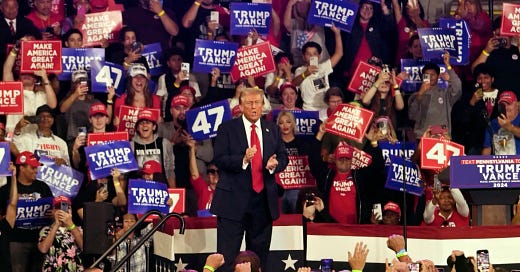
Discover more from The Liberal Patriot
Nation-First Public Policy
Instead of fighting useless partisan battles over niche issues, why not get together around key national priorities to help everyone succeed?

One unfortunate by-product of America’s increasingly sectarian politics is a dearth of policy ideas designed from the start to advance the country’s economic and security interests and the well-being of all Americans in all places.
The current policy development process goes something like this:
Survey what the leading (or loudest) activist groups and their policy arms are promoting institutionally or in the media.
Create a policy agenda—either real legislation or some “message bill” and sometimes just talking points—based on these activist policy concerns.
Jam one’s own party members to adopt these terms without question and accuse dissenters and the other party of perfidy if they do not accept them.
Get nowhere most of the time and pass a few things occasionally when the party numbers align, or some emergency crops up.
This party-first process explains the Build Back Better monstrosity that cobbled together every single item on the Democratic wish-list into an unworkable mega-bill that eventually brought down President Biden’s job approval numbers as negotiations dragged on and inflation started to spike. Biden basically squandered nine months of his presidency pursuing a strategy that deviated from his campaign promise to govern from the middle with broad consensus. This party-first model also explains why House Republicans today cannot agree on a basic budget in Congress and instead are seeking to tee up a series of culture war battles.
Recent legislative successes that ignored the typical partisan policy process include the bipartisan infrastructure bill, which was negotiated around the constant criticism of the Democratic Party left and blanket opposition from the right; the CHIPS and Science Act, which placed competition with China and domestic manufacturing at the center of successful cross-party discussions; and the Inflation Reduction Act, which reduced the Build Back Better hodgepodge to a few key items that at least all Democrats could agree on and garnered broad public support.
Two-party systems like ours with multiple checks and balances and veto points generally discourage more consensus-based policy development, particularly during a period of ideological alignment inside both parties as we see today. There simply aren’t enough liberal Republicans and conservative Democrats to regularly make common cause on important national matters and bypass the extremes.
Instead, Democrats and Republicans pretend that they exist in a parliamentary-like system where a basic majority passes its agenda and voters decide whether they like it or not in the next election. Or they hold on to the illusion of creating legislative super majorities at the federal level to permanently exclude the other party from the policy making process. "Compromise? No need to compromise, we're in charge!"
Since the two parties do not exist in a parliamentary structure, and neither one is close to building a long-term majority, politics is less about consensus policy development and more about constant fulminations in the media and online—performance art rather than governance. Democrats and Republicans create policies mostly as a means for political fights with the other side or to rally their own base. Big decisions get pushed off to the last minute and are often passed in a rush ahead of an impending calamity like a government shutdown or a real one like the Covid pandemic.
The American constitutional and two-party system is not going to change anytime soon, if ever. So, rather than just accept the bad results, what if dedicated patriots on the center-left and center-right created a new policy development process to replace the old party-first model with a nation-first one?
Mix-up the policy recipe to look something like this:
Agree to collectively address a handful of major national problems that affect everyone equally. No side issues.
Bring all available research and empirical evidence to the table on how best to address these problems.
Put together legislation in one specific area—not a massive conglomeration of issues—based on the best ideas on offer, not just the ones supported by the respective parties and their activists.
Build cross-party coalitions to pass these bills and keep out all side ideological demands and culture war distractions designed to blow up the process.
Nation-first policy development need not be an idle dream of government reformers and political scientists. It could start right now by focusing on three key national goals: comprehensively tackling crime, drugs, and homelessness in American communities; promoting economic development in distressed places across the nation; and fortifying our economy and national security against threats from China and Russia.
We’ve already made some good progress in trying to tackle the China and Russia threats. There is no reason why patriotic members of both parties couldn’t also get together to address the looming threats to our communities from crime and drugs and a lack of economic opportunity.
All it would take is a core group of dedicated members from each party to form a Nation-First caucus and get things rolling. Voters everywhere would love to see America’s dysfunctional politics replaced with earnest and meaningful attempts to help our nation and our people succeed.















